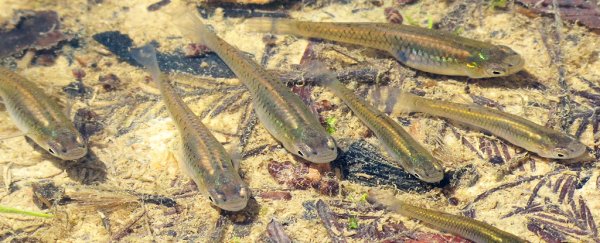Immersed in a 'drug soup' of pharmaceutical pollutants, aquatic wildlife acts in ways that puts them at risk of becoming an easily meal for predators. A new study now suggests it could also affect how they themselves hunt for food.
When researchers looked at the way eastern mosquitofish (Gambusia holbrooki) foraged in groups, they found antidepressants in our waste play havoc with the animals' social interactions in ways we'd never noticed in studies of individual fish.
The new research conducted by scientists from Monash University in Australia highlights a potential flaw in previous studies that determine the impact of psychoactive waste on wildlife.
"The results are significant because they suggest that behavioural tests in social isolation may not accurately predict the environmental risk of chemical pollutants for group-living species," says biologist Jake Martin.
Evidence has been mounting over recent years that the drugs we take to deal with a litany of psychological conditions are not only destined for our lakes and rivers, but potentially influencing the behaviours of the animals who live there.
Fluoxetine is just one example. Better known by its commercial name Prozac, the drug blocks transport channels in neurons that would otherwise be soaking up a messenger chemical called serotonin.
In humans, drugs that block serotonin reuptake channels can help stave off depression. But we're not the only animal with this neurological gateway. All vertebrates have it, leaving open the question of how the medication might be affecting their brains, too.
The question isn't merely academic, either. Fluoxetine has been found in aquatic ecosystems at concentrations of up to several hundred nanograms per litre, making it a pollutant we ought to know more about.
To put the drug to the test, researchers typically rely on watching solitary fish swim around in tanks. It's a practical solution that limits variables and makes for easier observation of behavioural changes in the animals.
"However, few studies have considered how the response of exposed organisms might be mediated by social context," says Martin.
To see if fish numbers made any difference, the team collected female mosquitofish from an uncontaminated site in the wild and placed them in large tanks either one by one, or in groups of three.
Some fish were placed in low or high levels of fluoxetine for a month, while another group were left unexposed. All were then placed in tanks that allowed the researchers to watch how the fish hunted for their favourite meal, midge larvae.
For solitary fish on the prowl, exposure to the antidepressant made no difference to their eagerness to tuck in. But this wasn't the case when the fish were hunting in groups; the differences came down to their weight, since competition within a group drives the need for predatory fish to gobble as much as they can.
For animals that weren't exposed to any fluoxetine, it was a race among members - the greater the variation in their weights, the more aggressively each fish ate. Similarly, the lower the group's average weight, the more they foraged.
But being exposed to relatively high doses of antidepressant seemed to have a chilling effect on this dynamic.
"Fluoxetine exposure disrupted the relationship between the total number of prey consumed and standard deviation in group weight," says behavioural ecologist, Bob Wang.
For the exposed fish, neither their average weight nor variation could predict the number of aggressive interactions they had while looking for food.
The study stops short of showing how this change in aggression might influence survivability in the wild, but it's hard to imagine that anything that reduces the amount of food a fish might eat could be a good thing.
Clearly we've got a problem with how we manage our pharmaceutical waste. Medications like fluoxetine play a vital role in maintaining the health and wellbeing of millions, making it important we are careful with how we dispose of unused medication, and filter the waters we flush.
As far as the research goes, future studies will need to consider not only how the mix of medications we're releasing into the environment might change individuals, but how it might affect entire groups of animals.
"Our results suggest that social context may be an important, but underappreciated, factor influencing the ecological impacts of chemical pollutants on wildlife," says Martin.
This research was published in Biology Letters.
